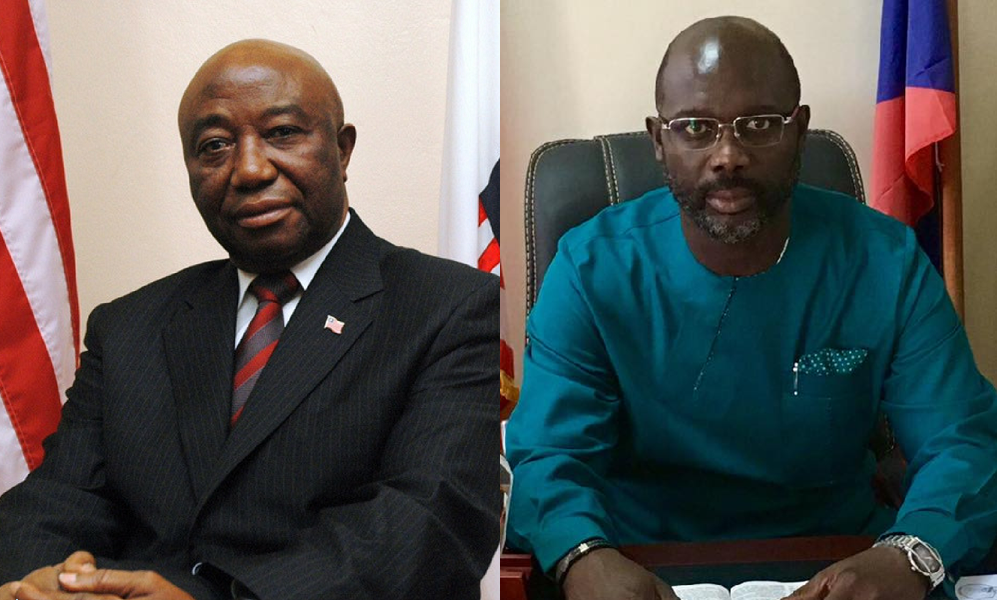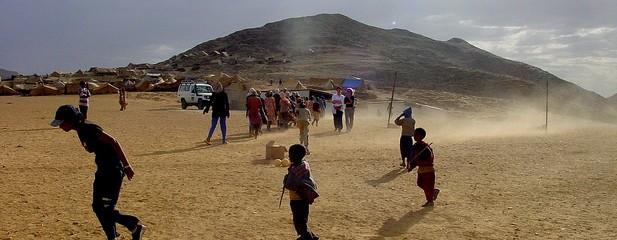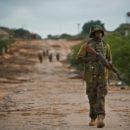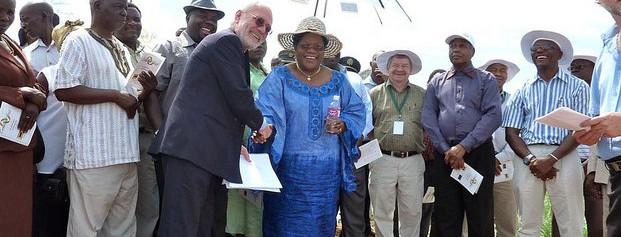Liberia’s election run-off: A choice between two imperfect options

Keeping the incumbent party in office may be difficult to bear, but hope that the opposition will bring change may also be misplaced.

The two contenders: Joseph Boakai (left) and George Weah (right).
Musa Lamine was sitting under his market stall listening attentively to his radio when the news came over the airwaves. None of the 20 contestants in Liberia’s 10 October presidential election had won outright, the presenter announced. That meant there would be a run-off between the two frontrunners, one of whom, it was confirmed, is his candidate. Lamine jumped up to rapturous celebration.
“Finally, I am happy that even though my candidate did not win, we will go for a second round,” he exclaimed. “Now I will campaign harder to make sure my country doesn’t fall into the wrong hands.”
As Liberia gears up for the 7 November run-off, talk of the “right hands” and “wrong hands” has dominated the political discourse. But voters are divided on which option represents which.
For the third time now since the end of the civil war in 2003, Liberians face a choice between the same two parties: the ruling Unity Party (UP), whose candidate Vice-President Joseph Boakai garnered 28.8% in the first round; and the opposition Coalition for Democratic Change (CDC), whose nominee George Weah reached 38.4%
In both the 2005 and 2011 elections, the UP’s Ellen Johnson Sirleaf emerged victorious in the run-off. But could 2017 prove to be third time lucky for the opposition?
The ruling party
The ruling UP is currently dogged by in-fighting and has limited resources compared to previous campaigns. After 12 years in office, in which its record was unflattering on several fronts, it is struggling to convince Liberians that it can make a positive difference going forwards.
In her last State of the Nation address, the outgoing President Sirleaf admitted that her government had failed to reconcile the Liberian people and had fallen short in the war on corruption. Under her watch, the government signed dozens of agreements with foreign companies regarding Liberia’s natural resources that allegedly violated national and international laws. Nepotism was rife. And several senior UP officials were engulfed by scandals and are facing corruption trials.
At the same time, the economy has faltered heavily. Inflation has soared, the price of living has increased, and the economy has gone into recession.
The opposition
It is in this context that many Liberians are hoping to follow their counterparts elsewhere in West Africa in unseating long-seated incumbents. In the first round, the CDC got the highest number of votes by a large margin, contesting as a coalition of three parties in its seemingly well-funded campaign.
However, for those bidding for change, hope in the CDC may be misplaced.
To begin with, the party’s campaign platform is reminiscent of the ruling party’s and is made up of similarly vague and anachronistic platitudes.
At the same, the CDC also seems to be looking backwards rather than forwards. Weah’s running mate is Jewel Howard-Taylor, the ex-wife of the convicted warlord and former president Charles Taylor. According to some observers, this joint ticket is a golden opportunity for the political rebirth of Taylor’s hardliners who have vowed to bring back the former leader’s agenda if elected.
The CDC is also not immune from the corruption scandals either. After all, the third party in Weah’s coalition is led by a former speaker of the house who was removed from office following serious allegations of corruption.
The CDC maintains a loyal base of youthful and exuberant supporters. Weah’s own story in becoming one of the world’s leading football players still inspires many. But there are concerns that if the CDC takes office, tainted politicians from the other parts of his coalition will be the ones that end up calling the shots.
A pick of personalities
With the two parties bearing such defects, the prospects of stable and sound leadership might lie in the competence and character of individual leaders.
Amongst his supporters, the UP’s Boakai is seen as a loyal and principled individual with a wealth of experience in government spanning nearly 40 years. He has promised improved infrastructure, economic indigenisation and a public service manned by competent home-based professionals. Boakai’s advocates claim he has the vision Liberia needs and that his staunch stance against corruption puts him at arms-length from President Sirleaf, who has stayed away from the campaign trail.
Boakai’s critics, however, insist that as vice-president for 12 years, he should be held just as accountable as Sirleaf for the government’s record on the economy and corruption. It is perhaps his proximity to Sirleaf that accounts for some of the UP’s poor electoral performance in its traditional strongholds.
In the other corner, Weah is more clearly an outsider, though he is no longer the political novice he was when he first entered politics in 2005, untainted by the country’s troubled past. The former football legend lost the presidential race in 2005 and again came second, as a vice-presidential candidate, in 2011.
In 2014, Weah successfully contested for a senate seat in Montserrado County. His election to the senate was seen by supporters as an opportunity to gain experience, but a legislative report card developed by a local civil society group suggested that Weah performed poorly in the role.
Nonetheless, the CDC’s candidate is once again promising change, free social services and a campaign to root out corruption. But with close allies of Sirleaf, including members of her cabinet, supporting Weah, and the opposition leader’s recent promise to “protect” Sirleaf and her family if elected, observers are questioning the credibility of his campaign for change.
Having narrowed down the field from twenty candidates, Liberians on 7 November will be left to choose whether they want the UP’s Boakai or the CDC’s Weah to oversee the country for the next six years.
But with very limited specifics on policy proposals from both sides, voters face a difficult decision. The key task for them will be to interrogate the credibility of the candidates’ promises and their competency to deliver on those promises.







Well penned! Thank you for the objective analysis as it relates to the decision we have to make come November 7, 2017.
The Liberian scenario:
Since this is going to be the first elections were a sitting president of liberia is turning over power to another President, in the life Span of many of us if not all of us, I believed our President, Madam Ellen Johnson Sirleaf is going to pick her successor.
From all indications, she has fallen with her party base on party policy. Now that her golden boy Robert Sirleaf who bankrupt NOCA, national Oil Company and coursed many economic harm to Liberia is fully supporting the CDC, Madam Sirleaf will feel good by picking her son Friend Grorge Weah as her successor as a guaranteed from persecution.
The UP may not give her that protection since they where marginalized by Robert Sirleaf who is like a prime minister.
As it stance, CDC will automatically win these elections.
Nice piece, comrade Ibrahim Al-bakri Nyei. Your analysis of the process is once again unbiased and factual.
FELLOW COUNTRY MEN AND WOMEN, I WRITE TO CALL ON US TO VOTE KING GEORGE MANNAH OPONG WEAH AS THE NEXT PRESIDENT AND COMMANDER -IN- CHIEF OF THE ARMED FORCES OF THE REPUBLIC OF LIBERIA IN THE NEXT ELECTION.
LET`S UNITE FOR TOTAL PEACE AND STABILITY IN LIBERIA.
LONG LIVE LIBERIA, LONG LIVE LIBERIANS AND LONG LIVE AFRICA.
I LOVE YOU ALL. STAY BLESS ALWAYS.
comrades I have been informed that Weah will be next president of Liberia but, his disposition toward slaughter of Malinke people by evil Charles Taylor is nothing taken lightly by Malinke people plus their comrades throughout this world. Weah should fashion his speech plus actions to be more compatible with expectant of a world leader. To pretend slaughter of Malinke was no big deal implies no livesof liberia have value including his or his love ones. If conditions in Liberia go violently wrong for Malinke or/plus muslims we expect them to go violently wrong for Weah. In short Weah is expendable as any people of Liberia. Personally my opposition to Weah lies in fact Africa possess over abundance of cocaine crack using leaders who are incompetent plus apathetic to their people demise. Weah appear to be another member of that group with intent on serving will of Charles Taylor however, a new day plus new way is before us plus demand suitable change. What Africa need as President of Buhari of Nigeria righteously put it are leaders who implement sound plans existing. Crack heads as already proven in Liberia by existing leadership do not do that. Kicking a soccer ball in no way prepare a person to be a life or death leader. I hope Weah other life events have prepared him for such duty. Very much sincere, Henry Price Jr. aka Obediah Buntu IL-Khan aka Kankan aka Gue.
I have tried to follow politics very closely since 2005 and have also observed that politics in Liberia is quite different from what we all see and observed in other countries. Liberia is at a crossroad, a critical time in the country’s history and we have a major decision to make as a people. Politics in Liberia is not graded on the basis best policy options, highly qualified candidate or most experienced person. Recent history has proven that those elected to the Liberian Legislature were not based on competence, qualification or experience, In fact, people elect their leaders based on what they can get at that moment and forget that they have to live with that decision for six or more years.
The case of the Runoff elections on November 7, 2017. Personally, I have been contemplating on UP third term, what it means for the ordinary Liberians? A country that has over half of its population illiterate, many of whom lived below the global poverty line and lacks basic social services especially in the rural parts of the country are desiring for a change in the administration with a hope for change.
After a two-term UP rule, I do believe that a change in administration will help shape the course of opportunities for many disadvantaged youths in Liberia. CDC or Weah may not be the best alternative at this time, but it the only option we have; given the situation at hand.
Thanks ever so much my good friend Ibrahim Al-bakri Nyei for such a critical political analysis of Liberia elections.
James Koryor
2017 US Department of State, Community Solutions Program Fellow